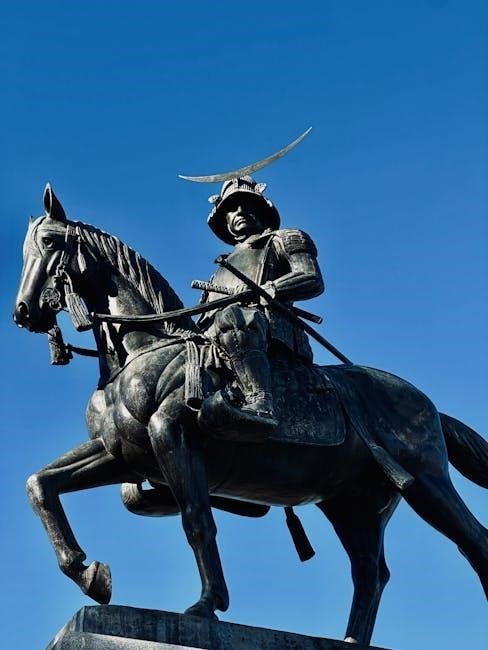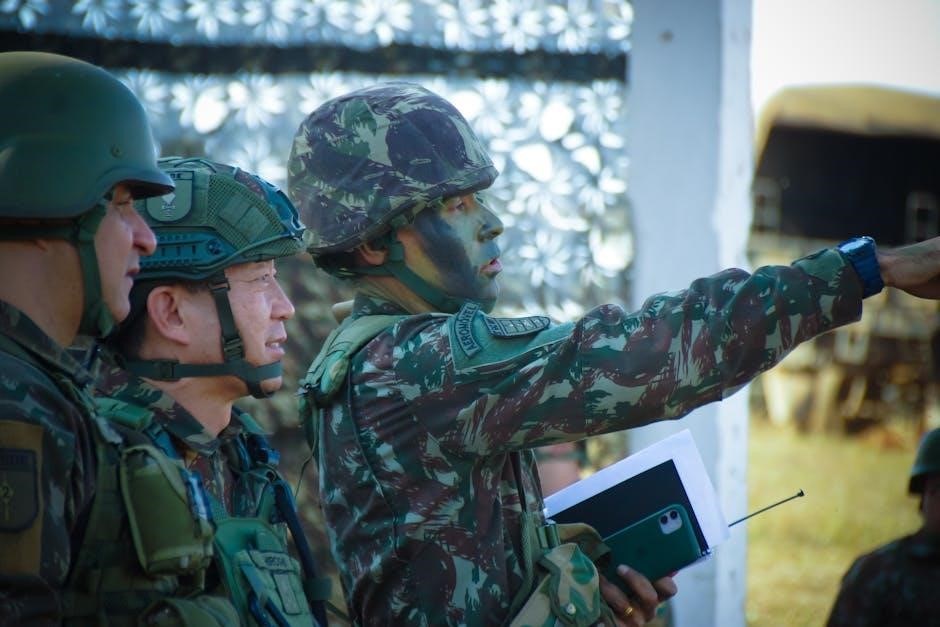Being a Tiger Den Leader is a rewarding role that involves guiding first-grade Cub Scouts through engaging activities, ensuring their safety, and fostering their development.

Role and Responsibilities of a Tiger Den Leader
A Tiger Den Leader guides first-grade Cub Scouts through planned activities, promotes Scouting values, ensures safety, and fosters leadership development while engaging parents in the process.
2.1. Specific Duties
A Tiger Den Leader has several key responsibilities to ensure a successful program. They plan and execute monthly themes, weekly meetings, and outdoor activities. Leaders guide Tigers through core and elective adventures, fostering skill development. They also maintain safety standards and emergency preparedness. Engaging parents through effective communication and involving them in activities is crucial. Leaders work closely with assistant leaders and den chiefs to distribute tasks and ensure smooth operations. They track progress, provide feedback, and help Tigers earn required advancements. Additionally, they prepare for pack meetings and Go See It outings, ensuring alignment with the Scouting program; These duties require strong organizational, communication, and leadership skills to create a positive and enriching experience for both Scouts and their families.
2.2. Working with Assistant Den Leaders
Collaborating with assistant den leaders is essential for a well-rounded program. The primary leader delegates tasks, ensuring a balanced workload and diverse skill contributions. Clear communication and shared responsibilities help maintain consistency in meetings and activities. Assistant leaders can focus on specific areas, such as crafts, games, or outdoor events, while the den leader oversees the program’s broader goals. This teamwork ensures that all aspects of the Tiger Cub experience are covered, providing a supportive environment for both Scouts and their families. By working together, leaders can address challenges effectively and create a positive, engaging experience for everyone involved.
2.3. Guiding Den Chiefs
Guiding den chiefs is a key responsibility for Tiger Den Leaders. Den chiefs are typically older Scouts who assist in leading activities and mentoring younger Cub Scouts. The den leader should ensure that den chiefs receive proper training and guidance to fulfill their roles effectively. This includes helping them understand their responsibilities, such as assisting with meetings, leading games, and supporting the den leader. By fostering a positive and collaborative relationship, the den leader can help den chiefs develop leadership skills while ensuring a smooth and enjoyable experience for the Tiger Cubs. Regular feedback and encouragement are essential to help den chiefs grow in their roles and contribute meaningfully to the den’s success.

Planning and Organizing Meetings
Plan meetings in advance, setting clear goals for each session. Organize fun, engaging activities aligned with monthly themes, ensuring materials are prepared and safety is maintained.
3.1. Monthly Themes and Plans
Monthly themes provide a structured framework for Tiger Cub activities, ensuring a balanced and engaging program. Den leaders should align themes with Cub Scout Adventures and pack events. Each month, leaders create a detailed plan outlining meetings, outings, and activities that tie into the theme. Key considerations include the pack calendar, seasonal relevance, and scout interests. Themes should promote skill development, teamwork, and fun. Leaders must ensure activities are age-appropriate and safe. A well-planned theme fosters excitement and progression, helping Tigers achieve their rank requirements. Collaboration with parents and dens is crucial for successful execution. A 12-month plan helps maintain continuity, while flexibility allows for adjustments based on scout feedback and needs.
3.2. Weekly Meeting Agendas
A well-structured weekly meeting agenda is crucial for effective Tiger Cub meetings. Each agenda should outline the schedule, balancing activities, games, and skill-building exercises. Leaders should plan in advance, aligning with the monthly theme and scout progress. Safety is a priority, with time for discussions or reviews. Sharing the agenda with parents aids in organization and preparation. Meetings should start and end on time, within the recommended duration for young scouts. Flexibility is essential to adapt to changes, keeping activities engaging; A clear agenda maintains focus, creating an environment where Tigers can learn, grow, and enjoy themselves. Proper planning ensures a productive and enjoyable experience for all involved.
3.3. Organizing Go See It Outings
Go See It outings are a key part of the Tiger Cub program, offering hands-on learning experiences. These outings typically occur monthly and are designed to connect Tigers with their community. Leaders should plan outings aligned with the monthly theme, ensuring they are age-appropriate and engaging. Locations such as museums, farms, or local businesses are ideal. Safety is paramount; leaders must follow BSA guidelines and ensure proper adult supervision. Communication with parents is essential, providing details about the outing and any necessary permissions; Outings should balance education and fun, fostering curiosity and teamwork among Tigers. By organizing these events, leaders help Scouts explore new interests and complete adventure requirements while creating lasting memories. Proper planning ensures a safe and enriching experience for all participants.

Safety in Scouting
Safety in Scouting requires adhering to BSA guidelines, ensuring emergency preparedness, and maintaining a secure environment for all Tiger Cubs during activities and outings.
4;1. General Safety Guidelines
Ensuring the safety of Tiger Cubs is paramount. Den leaders must follow BSA guidelines, including youth protection training and proper adult supervision ratios. Maintaining a safe environment involves securing parental consent for outings, conducting meetings in well-lit, accessible locations, and ensuring all activities are age-appropriate; leaders should also be trained in first aid and have emergency contact information readily available. Health forms for each Cub Scout should be kept on hand. Open communication with parents about safety protocols is essential. By adhering to these general safety guidelines, leaders can create a secure and enjoyable experience for all participants.
4.2. Emergency Preparedness
Emergency preparedness is crucial for ensuring the safety of Tiger Cubs and leaders. Develop a comprehensive emergency response plan, including procedures for injuries, severe weather, and evacuations. Ensure all leaders are trained in first aid and CPR. Maintain a well-stocked first aid kit at every meeting and outing. Communicate emergency contact information to parents and ensure it’s easily accessible. Conduct regular safety drills to prepare Cub Scouts for potential emergencies. Establish a communication plan to keep parents informed during an incident. Always have a backup plan for outdoor activities in case of unexpected conditions. By being proactive, leaders can minimize risks and respond effectively if an emergency arises.

Engaging Parents and Guardians
Effective communication and active involvement are key to engaging parents in their child’s Scouting journey, fostering a collaborative and supportive environment for all Tiger Cubs.
5.1. Effective Communication Strategies
Effective communication is vital for engaging parents and guardians in their child’s Tiger Cub experience. Regular updates through emails, newsletters, or Scouting apps ensure transparency and keep families informed. Clear and concise messages help parents understand their roles and how they can contribute. Actively listening to their feedback and being responsive builds trust and collaboration. Utilizing digital tools like group chats or shared calendars can streamline coordination and reminders. Additionally, face-to-face interactions during meetings or outings foster a sense of community and shared purpose. By maintaining open lines of communication, den leaders can empower parents to support their child’s growth and participate meaningfully in the program.
5.2. Involving Parents in Activities
Involving parents in Tiger Cub activities strengthens their connection to the program and fosters a sense of community. Assigning parents specific roles, such as helping with crafts or leading a game, empowers them to contribute meaningfully. Encouraging parents to share their skills or hobbies during meetings can create engaging experiences for the Scouts. Additionally, involving parents in planning outings or service projects ensures diverse perspectives and shared ownership of the program. Recognizing their contributions, whether through verbal appreciation or small gestures, motivates continued involvement. By creating opportunities for parents to participate actively, den leaders can build a supportive and collaborative environment that benefits both the Scouts and the families involved.
5.3. Building a Parent-Den Leader Partnership
Building a strong partnership with parents is essential for a successful Tiger Cub program. Open communication is key, ensuring parents are informed about meetings, activities, and their child’s progress. Regular updates through newsletters, emails, or online platforms help keep parents engaged. Encouraging parents to share their skills or expertise enriches the program and creates a sense of ownership. By fostering a collaborative environment, den leaders can rely on parents for support while empowering them to take an active role in their child’s Scouting journey. Recognizing parents’ contributions and maintaining a positive, respectful relationship strengthens the partnership and ensures a united effort in guiding the Tigers.

Cub Scout Adventures
Cub Scout adventures are designed to engage Tigers in exciting, age-appropriate activities that promote learning, teamwork, and fun; Core adventures like “My Tiger Jungle” and electives like “Tiger-ific!” help develop essential skills, fostering growth and confidence in young scouts.
6.1. Core Adventures for Tiger Cubs
Elective adventures provide Tiger Cubs with opportunities to explore diverse interests and skills beyond the core requirements; These activities are optional and allow dens to tailor their program to the scouts’ preferences. Examples include “Tiger-ific Day,” where scouts participate in outdoor games and nature activities, and “Tiger Tales & Songs,” which fosters creativity through storytelling and music. Other electives, such as “Tigers in the Wild” and “Good Knights,” focus on outdoor exploration and community service, respectively. These adventures help scouts develop new abilities, build confidence, and strengthen teamwork. Leaders can choose electives that align with their den’s interests, ensuring a well-rounded and engaging experience. By offering variety, elective adventures keep the program exciting and meaningful for young scouts. This flexibility allows leaders to create a personalized journey for their Tiger Cubs.

Tiger-Specific Activities
Tiger-specific activities include engaging games, creative crafts, and exciting outdoor events designed to build skills, encourage participation, and foster teamwork among young scouts while aligning with Scouting values.
7.1. Games and Crafts
Games and crafts are essential components of Tiger Cub activities, designed to engage young scouts while teaching important skills. These activities encourage creativity, teamwork, and problem-solving. Simple games like scavenger hunts or relay races promote physical activity and camaraderie. Crafts, such as making handmade items or DIY projects, foster fine motor skills and imagination. Both games and crafts are tailored to the age and ability of Tiger Cubs, ensuring they are safe, fun, and meaningful. These activities also align with Cub Scout values, helping boys develop confidence and a sense of accomplishment. Leaders should plan these activities carefully, ensuring they fit within the Tiger Cub Scout Adventures and provide opportunities for growth and learning.
7.2. Outdoor Activities
Outdoor activities are a cornerstone of the Tiger Cub program, offering boys opportunities to explore nature, develop teamwork, and build confidence. These activities, such as nature walks, scavenger hunts, or outdoor games, are designed to be age-appropriate and safe. Leaders should ensure that outings align with Cub Scout Adventures and promote environmental awareness. Outdoor experiences also provide chances for Tigers to practice safety skills and leadership. Leaders should plan ahead, ensuring proper supervision and necessary materials. These activities not only foster a sense of adventure but also help boys connect with their communities and the natural world. By engaging in outdoor events, Tiger Cubs develop essential skills while creating lasting memories.
7.3. Community Service Projects
Community service projects are an essential part of the Tiger Cub program, teaching boys the value of giving back and contributing to their communities. These projects, such as food drives, park cleanups, or visiting nursing homes, help Tigers develop a sense of citizenship and compassion. Leaders should choose age-appropriate activities that align with Cub Scout values and promote teamwork. Parents and guardians are encouraged to participate, fostering a sense of family involvement. By engaging in community service, Tiger Cubs learn the importance of helping others and making a positive impact. These experiences not only benefit the community but also help boys develop empathy and leadership skills, shaping them into responsible individuals.

Leadership Development
Leadership development empowers Tiger Cubs to grow into confident, capable leaders. Through the Denner role and guided responsibilities, boys learn teamwork, decision-making, and accountability, fostering lifelong leadership skills.
8.1. The Denner Role
The Denner role is a key leadership opportunity for Tiger Cubs, typically rotated among members to share responsibilities. Chosen by their peers or Den Leader, the Denner assists in leading meetings, organizing activities, and setting a positive example. This role helps build confidence, teamwork, and accountability, essential for young leaders. The Denner also helps with event planning and ensuring everyone is included, fostering a sense of unity and purpose within the den. By empowering Tigers with this role, Den Leaders cultivate future leaders and strengthen the scouting experience. The Denner’s contributions are vital to the smooth operation of the den and the growth of each member.
8.2. Building Confidence in Tigers
Building confidence in Tiger Cubs is a cornerstone of the Den Leader’s role. By fostering a supportive environment, leaders help Tigers feel valued and empowered. Positive reinforcement, encouragement, and celebrating small achievements are key strategies. Encouraging participation in activities like games, crafts, and outdoor adventures allows Tigers to explore their abilities and gain self-assurance. Leadership roles, such as the Denner position, further enhance confidence by giving Tigers opportunities to lead and contribute meaningfully. Creating a safe space for them to try new things without fear of failure is essential. This approach ensures Tigers develop resilience, self-belief, and a sense of accomplishment, laying a strong foundation for their scouting journey and beyond.

Resources and Tools
Den Leaders can utilize essential resources like the Cub Scout Leader Book, online training modules, and scouting apps to manage activities effectively.
9.1. Training for Den Leaders
Effective training is crucial for Tiger Den Leaders to succeed. The BSA offers online training modules and live sessions to equip leaders with essential skills. These programs cover activity planning, safety protocols, and youth development strategies. Additionally, the Scouting App provides resources to track progress and communicate with parents. Leaders are encouraged to complete the first 30 days training and attend live workshops for hands-on experience. These tools ensure Den Leaders are well-prepared to create engaging and safe experiences for their Tigers, fostering growth and fun within the Cub Scout program.
9.2. Essential Handbooks and Guides
The Tiger Cub Den Leader Guide is a vital resource for planning and executing a successful program. It outlines core adventures, elective activities, and meeting ideas. Additionally, the Cub Scout Handbook provides essential information on awards, advancements, and age-appropriate activities. Leaders can also utilize the Scouting App, which offers digital tools to track progress, manage den activities, and communicate with parents. These resources ensure leaders are well-equipped to deliver a engaging and structured program tailored to the needs of first-grade Cub Scouts. By leveraging these handbooks and guides, Den Leaders can create meaningful experiences that foster growth, teamwork, and fun for their Tigers.
9.3. Utilizing Online Platforms

Online platforms are invaluable tools for Tiger Den Leaders to enhance their program delivery. The Scouting App allows leaders to track Cub Scout progress, manage den activities, and communicate with parents seamlessly. Additionally, platforms like Google Workspace can facilitate collaboration and organization of meeting plans and resources. Online training modules, such as those offered by the Boy Scouts of America, provide Den Leaders with the knowledge and skills needed to excel in their roles. By leveraging these digital tools, leaders can streamline tasks, maintain clear communication, and ensure a well-organized program for their Tigers. These resources empower leaders to focus on creating engaging and meaningful experiences for their Cub Scouts.
Serving as a Tiger Den Leader is a fulfilling experience that shapes young lives through scouting adventures and character development. By following this guide, leaders can effectively plan meetings, ensure safety, engage parents, and foster leadership skills. The role requires creativity, patience, and dedication to create meaningful experiences for Tigers. With proper preparation and support, leaders can help Cubs grow into confident, capable individuals. This guide provides essential tools and insights to navigate the responsibilities of a Tiger Den Leader successfully, ensuring a positive and impactful journey for both leaders and their scouts.

